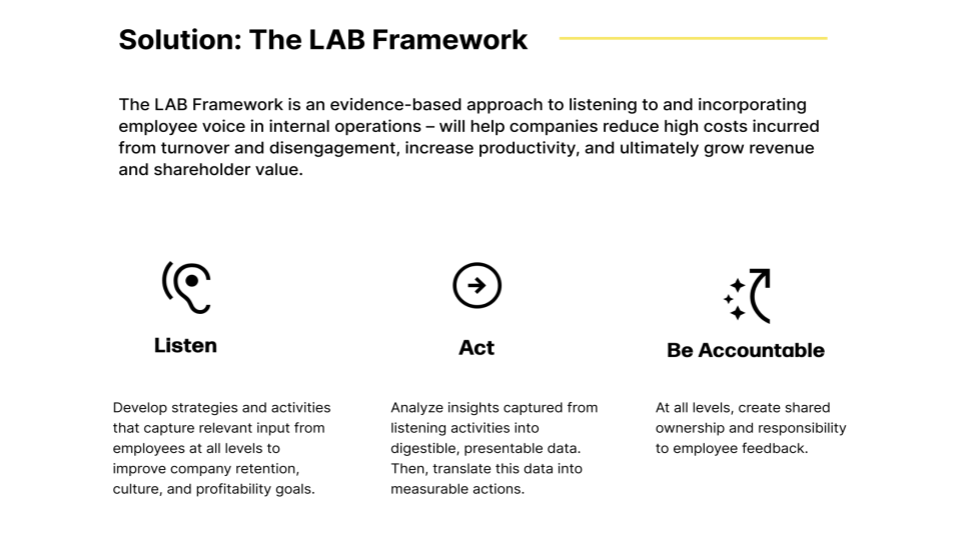Listen to Lead: Amplifying Worker Voice to Drive Outcomes
May 15, 2024
Strategies to Learn and Build Stronger and More Impactful Businesses
Feedback loops are crucial for an organization to implement workers’ insights and experiences. These vital stakeholders have unique and valuable visibility into a business’s resilience and success — but only if leaders recognize this value and listen to what employees share. Establishing regular ways to collect and act on worker feedback helps Certified B Corporations and other businesses build resilience, attract and keep employees, and enhance their bottom line.
“Listening to employees helps identify complex problems and positively influences other aspects of a business. In listening, retention improves — employees and customers — culture improves, and ultimately the bottom line improves,” says Raj Aggarwal, president of Provoc, a B Corp strategic marketing and communications firm specializing in outcome-driven design.
For B Corps, workers are a prioritized stakeholder as part of a company’s B Impact Assessment. The proposed standards for B Corp Certification reinforce the importance of listening to workers and acting on their ideas to shape business strategies and products. The workplace culture impact topic within the draft standards will require companies to demonstrate how they consider worker feedback and inform employees of how their feedback was addressed. The new requirements are designed to help B Corps continue to lead in new ways as socially responsible businesses that incorporate the needs and concerns of employees and other stakeholders.
This article highlights information and a resource guide shared by Aggarwal in a session at Champions Retreat 2024, the semiannual B Lab U.S. & Canada gathering. The Listen to Lead: Raise Retention and Boost Business guide and its principles are designed for purpose-driven organizations that are already aligned with the importance of prioritizing employees and centering them in their decision-making and culture-building processes.
It also features an example of gathering survey input and research from 60 Decibels, a tech-powered impact measurement company that helps organizations measure impact by listening to stakeholders, including voices through the supply chain. The survey process was designed to provide direct farmer feedback on B Corp Counter Culture Coffee and its bean supplier, Mountain Harvest.

A Guide to the Fair Work Impact Topic in Practice
This guide from B Lab U.S. & Canada provides examples and resources to support building workplaces where all workers feel valued, heard, and empowered.
Listen to Lead: Principles to Center Employees
Provoc’s Aggarwal said the Listen to Lead guide is the ultimate result of a question that the Ford Foundation posed to Provoc several years ago: What are the barriers to centering employees in decision-making? “Businesses say they want to do right by their employees but often make decisions that can be harmful to them,” Aggarwal said. “So we wanted to understand why and also better understand the data and the business case.”
Provoc and the Ford Foundation gathered information from grantee partners, Fortune 500 CEOs, investors, ESG experts, and qualitative research on workplace culture and employee engagement approaches. Aggarwal said that research helped reveal the importance of listening to workers and acting on their ideas.
The Listen to Lead guide outlines a three-part framework — the LAB framework — leaders can use to put the concepts into practice: Listen, Act, and Be Accountable. It’s an actionable framework to help prompt company growth and cultural change.
- Listen involves strategies and activities that capture relevant worker input. Companies can consider a range of data sources and formats to gather feedback: individually, in groups, or in cross-team collaboration through surveys, interviews, and other methods. Next, companies can create an ongoing internal structure and framework for employee feedback loops.
- Act puts those insights into practice. Businesses can invest in employee development that fosters an adaptive workplace. It’s also important to follow up with meaningful action plans and share the results of collected feedback. This helps foster engagement and trust across the business. Acting on feedback creates a foundation for stable employment and business growth.
- Be accountable includes creating shared ownership and measuring progress on employee-shaped initiatives. It can mean including employees on internal boards and making integrity and ethics regular conversation topics. Leaders should also seek feedback on their progress from peers and team members.
Aggarwal said smaller companies that face resource constraints can choose one or two mechanisms for employee listening, such as surveys or listening tours. “Only ask questions that would enable you to take action on something,” he said. “This clarity of purpose up front will help a company be efficient with resources and immediately surface insights to take action on.”
Senior leaders play a crucial role in building organizational culture, and the LAB framework reinforces that listening is a crucial first step. “If employees don’t feel safe to offer feedback or insights, they won’t be honest. A culture that creates psychological safety is a key component of listening,” Aggarwal said.
The full version of Listen to Lead includes examples and quotes about employee engagement efforts at B Corps Rhino Foods, Beneficial State Bank, and Seventh Generation, which have experience using pieces of the LAB framework.
Download a shortened version of the Listen to Lead guide and find the full version with other information at listentoemployees.org.
Beyond the Office: Supporting Stakeholder Input Through the Supply Chain
60 Decibels speaks directly to customers, employees, or beneficiaries to provide the information organizations need to better serve these stakeholders in ways that improve their lives. To date, 60 Decibels has worked with 15 B Corps worldwide, including B Corp Counter Culture Coffee and its bean supplier, Mountain Harvest. Counter Culture and Mountain Harvest participated in the Coffee Farmer Thriving Index with 60 Decibels to explore the question: Are farmers in coffee supply chains thriving or barely surviving?
Over 12 million smallholder farmers cultivate coffee to earn a living. Foundations, NGOs, and coffee companies collectively invest billions of dollars in programs and certifications to improve these farmers’ lives. Yet, the effectiveness of these programs, from the farmers’ perspective of what does or does not improve their well-being, is either not measured or measured inconsistently.
Counter Culture and Mountain Harvest participated in the Farmer Thriving Index, a standardized survey that measures the well-being of farmers across four key themes: living standards, climate and financial resilience, a farmer’s outlook on the future of coffee as a livelihood, and food security. 60 Decibels’ researchers conducted phone interviews in local languages with 275 of Mountain Harvest’s smallholder coffee producers in Uganda.
Katie Carguilo, Coffee Manager at Counter Culture, said the evaluation aimed to inform its work with Mountain Harvest, which works directly with smallholder farmers. The main goals were to understand the effectiveness of their initiatives and help them gauge their impact.
“Counter Culture believes in the sustainability of sourcing quality coffee at premium prices from the same farmers annually, which enhances the livelihoods of coffee producers,” Carguilo said. “It’s important to highlight that our primary interactions are with cooperatives, exporters, and importers, who play pivotal roles in shaping support structures, implementing services, providing financing, and distributing value to farmers. While our direct engagement with smallholder farmers is limited, we actively engage in pricing negotiations, fund sustainability projects, and prioritize understanding the needs of our suppliers.”
Kenneth Barigye, managing director of Mountain Harvest, said the survey will inform Mountain Harvest’s education and outreach strategy on agricultural practices. For example, since only 29% of farmers mentioned planting shade trees, they will double down on efforts to promote this practice for the well-being of coffee plants, biodiversity, and soil health. Furthermore, the survey showed a desire for extension services such as weather updates and credit access, which Mountain Harvest will explore expanding. Lastly, the survey reported that 55% of farmers plan to invest in fertilizers, prompting Mountain Harvest to ensure the availability of organic inputs and educate farmers on their proper use, aligning with the strong market demand for organically grown coffee.
When considering impact, Carguilo said it’s crucial to maintain a holistic perspective and a focus on specific details. It’s also equally important to seek areas for improvement while acknowledging structural constraints. For example, feedback on farmers’ living standards and profitability needs to be placed in the context of global coffee pricing and farm diversification processes and progress.
Find more information about the Coffee Farmer Thriving Index.
Additional Resources for Gathering Worker Voice
In this article’s example, the critical first step is to challenge assumptions and seek, with an open mind and open ears, the feedback from stakeholders the organization aims to impact positively. Find more examples of businesses seeking worker feedback and resources to incorporate what was learned below:
- Former Best Buy CEO Hubert Joly: Empowering Workers to Create ‘Magic’
- Open Space Case Study: Pearson Education
- Listen to Lead guide case studies on pages 26, 40, 49, and 52
-

-

-

-

Workplace Culture
Employee Ownership for Any Business Size: B Corps Chart a More Inclusive Path
Read More
Sign Up for our B The Change Newsletter
Read stories on the B Corp Movement and people using business as a force for good. The B The Change Newsletter is sent weekly.

